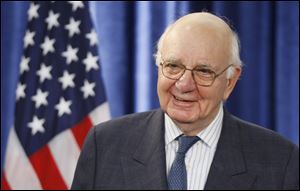
Bank investing curb advances
FDIC adds approval to plan required under overhaul law
10/12/2011
Former Federal Reserve Chairman Paul Volcker, chairman-designate of the Economic Recovery Advisory Board, listens to President-elect Barack Obama as he speaks during a news conference in Chicago.
WASHINGTON -- Banks would be barred from trading for their own profit instead of their clients' under a rule being proposed by federal regulators.
The Federal Deposit Insurance Corp. backed the draft rule on a 3-0 vote yesterday.
The ban on proprietary trading was required under last year's financial overhaul law.
For years, banks had bet on risky investments with their own money. But when those bets go bad and banks fail, taxpayers could be forced to bail them out. That's what happened during the 2008 financial crisis.
The draft of the so-called Volcker Rule, named for former Fed Chairman Paul Volcker, also has been approved by the Federal Reserve Board.
The Securities and Exchange Commission is to vote on the rule today, and Treasury Department is to vote later. The public has until Jan. 13 to comment. The rule is expected to take effect next year after a final vote by all four regulators.
The rule also would limit banks' investments in hedge funds and private equity funds, which are lightly regulated investment pools. Banks wouldn't be allowed to own more than 3 percent of such a fund. A bank's investments in such a fund couldn't exceed 3 percent of capital.
Within the rule's 294 pages, regulators seek feedback instead of offering precise definitions for many of the banned activities, which may leave financial firms uncertain about how to prepare for the final adoption of the rule next year.
In the proposal, regulators said it was hard to define allowed activities because that "often involves subtle distinctions that are difficult both to describe comprehensively within regulation and to evaluate in practice."
Consumer advocates want a final regulation that spells out exactly what banks can and cannot do.
"What you see over and over in this rule is a good principle in concept, and a step toward executing that principle," said Marcus Stanley, policy director at Americans for Financial Reform, a coalition of consumer groups.
"And then they won't close the loop by being clear about 'you cannot do this.' "
It's unclear how strictly the ban will be enforced.
For example, it can be hard to tell whether an investment is intended to benefit a bank or its clients and whether federally insured deposits could be put at risk by these trades.
And in some cases, banks can get around the rule and continue making proprietary trades.
For example, they can make such trades if they are intended to offset other risky trades made on behalf of clients.
Wall Street banks have complained that the ban on proprietary trading could prevent them from buying and selling investments that their customers might want.
It would also put U.S. financial firms at a competitive disadvantage to those in other countries.
At the same time, several big U.S. banks have already shut down their proprietary trading operations in response to enactment of the financial overhaul.